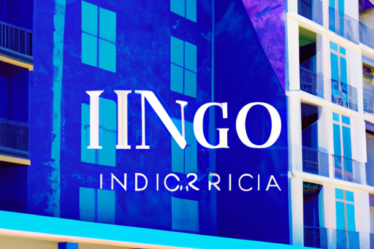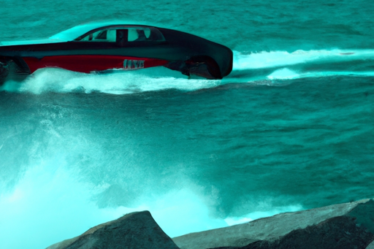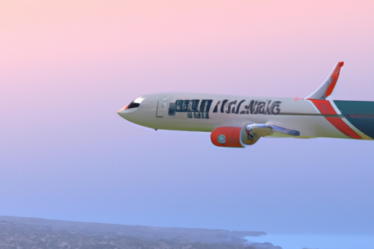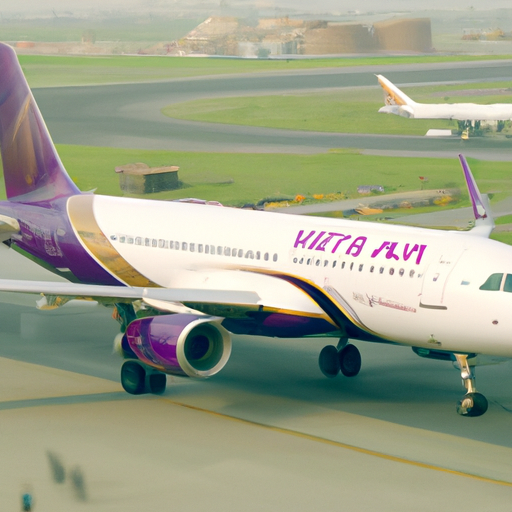
Improved Flight Efficiency with SITA’s eWAS and OptiClimb Solutions
Vistara, a leading Indian airline, has recently implemented SITA’s eWAS and OptiClimb solutions to improve flight efficiency. These innovative technologies are designed to enhance operational performance and reduce fuel consumption, ultimately benefiting both the airline and the environment.
eWAS, or Electronic Weather Avoidance System, is a state-of-the-art solution that provides real-time weather updates to pilots. By integrating weather data into the flight planning process, eWAS enables pilots to make informed decisions and optimize their flight paths. This not only improves safety but also helps to minimize delays caused by adverse weather conditions.
With eWAS, pilots can access up-to-date weather information, including thunderstorms, turbulence, and icing conditions, directly from the cockpit. This allows them to plan alternative routes or adjust their flight altitude to avoid potentially hazardous weather. By avoiding adverse weather conditions, Vistara can reduce the risk of in-flight incidents and ensure a smoother and more comfortable journey for passengers.
In addition to eWAS, Vistara has also implemented SITA’s OptiClimb solution. OptiClimb is a software application that analyzes various factors, such as aircraft weight, weather conditions, and air traffic control constraints, to determine the most fuel-efficient climb profile for each flight. By optimizing the climb phase, airlines can significantly reduce fuel consumption and emissions.
OptiClimb calculates the optimal climb profile based on real-time data and provides pilots with detailed recommendations on engine thrust settings and speed adjustments. By following these recommendations, pilots can achieve the most efficient climb, saving fuel and reducing the environmental impact of each flight. This not only benefits the airline’s bottom line but also contributes to Vistara’s commitment to sustainability.
By implementing eWAS and OptiClimb, Vistara aims to improve its overall flight efficiency and reduce its carbon footprint. These solutions enable the airline to make data-driven decisions that optimize flight paths and minimize fuel consumption. By reducing fuel burn, Vistara can lower its operating costs and contribute to a greener aviation industry.
Furthermore, the implementation of eWAS and OptiClimb demonstrates Vistara’s commitment to leveraging technology to enhance its operations. By embracing innovative solutions, the airline can stay ahead of the competition and provide a superior travel experience to its passengers.
SITA’s eWAS and OptiClimb solutions have already proven their effectiveness in improving flight efficiency for numerous airlines worldwide. By partnering with SITA, Vistara has joined a growing community of airlines that are harnessing the power of technology to optimize their operations and reduce their environmental impact.
In conclusion, Vistara’s implementation of SITA’s eWAS and OptiClimb solutions marks a significant step towards improved flight efficiency. By integrating real-time weather updates and optimizing climb profiles, Vistara can enhance safety, reduce fuel consumption, and contribute to a more sustainable aviation industry. With these innovative technologies, Vistara is well-positioned to provide a seamless and eco-friendly travel experience for its passengers.
Enhancing Safety Measures: Vistara’s Implementation of SITA’s eWAS and OptiClimb Solutions
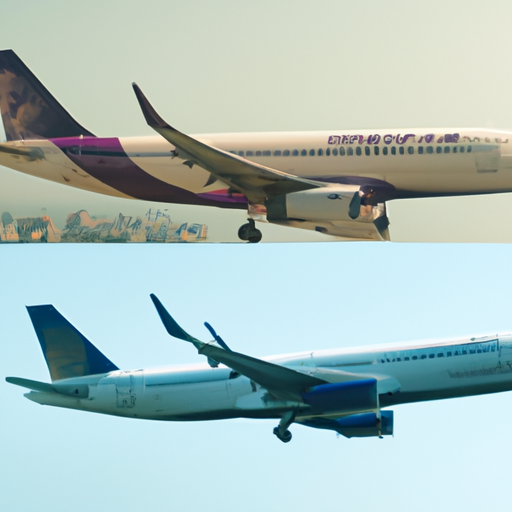
Vistara, a leading Indian airline, has recently implemented SITA’s eWAS and OptiClimb solutions to enhance its safety measures. These innovative solutions are designed to improve operational efficiency and reduce fuel consumption, ultimately benefiting both the airline and the environment.
eWAS, or Electronic Weather Avoidance System, is a state-of-the-art weather monitoring and avoidance solution. It provides real-time weather updates to pilots, allowing them to make informed decisions and avoid potentially hazardous weather conditions. By integrating weather data from multiple sources, eWAS ensures that pilots have access to the most accurate and up-to-date information, enabling them to plan their routes more effectively and avoid turbulence or storms.
OptiClimb, on the other hand, is a solution that optimizes climb profiles for aircraft. It uses advanced algorithms to calculate the most fuel-efficient climb profile for each flight, taking into account factors such as aircraft weight, weather conditions, and air traffic control constraints. By optimizing the climb profile, OptiClimb helps reduce fuel consumption and emissions, leading to cost savings for the airline and a smaller carbon footprint.
The implementation of these solutions by Vistara demonstrates the airline’s commitment to safety and sustainability. By equipping its pilots with eWAS, Vistara ensures that they have access to the most accurate weather information, enabling them to make informed decisions and prioritize passenger safety. This is particularly important in a country like India, where weather conditions can be unpredictable and severe.
Furthermore, the integration of OptiClimb into Vistara’s operations highlights the airline’s dedication to reducing its environmental impact. By optimizing climb profiles, Vistara can minimize fuel consumption and emissions, contributing to a greener and more sustainable aviation industry. This not only benefits the environment but also helps the airline save on fuel costs, which can be significant for an industry that operates on thin profit margins.
The implementation of eWAS and OptiClimb by Vistara is also a testament to the effectiveness of SITA’s solutions. SITA, a leading provider of IT and communication solutions for the aviation industry, has a proven track record of delivering innovative and reliable solutions to airlines around the world. Its eWAS and OptiClimb solutions have been widely adopted by airlines globally, with many reporting significant improvements in safety, efficiency, and sustainability.
In conclusion, Vistara’s implementation of SITA’s eWAS and OptiClimb solutions is a significant step towards enhancing safety measures and reducing environmental impact. By equipping its pilots with real-time weather updates and optimizing climb profiles, Vistara can ensure safer flights and minimize fuel consumption. This not only benefits the airline but also contributes to a greener and more sustainable aviation industry. With SITA’s proven expertise in delivering innovative solutions, Vistara can be confident in the effectiveness and reliability of these solutions. As the airline industry continues to evolve, it is crucial for airlines like Vistara to embrace technological advancements that prioritize safety, efficiency, and sustainability.
Streamlining Operations: Vistara’s Successful Integration of SITA’s eWAS and OptiClimb Solutions
Vistara, a leading Indian airline, has recently implemented SITA’s eWAS and OptiClimb solutions to streamline its operations and enhance its efficiency. This successful integration has allowed Vistara to optimize its flight planning and reduce fuel consumption, ultimately benefiting both the airline and the environment.
eWAS, or Electronic Weather Avoidance System, is a cutting-edge technology that provides real-time weather updates to pilots. By receiving accurate and up-to-date weather information, pilots can make informed decisions regarding flight routes and avoid adverse weather conditions. This not only ensures the safety of passengers and crew but also minimizes flight disruptions caused by weather-related issues.
OptiClimb, on the other hand, is a solution that optimizes climb profiles for aircraft. By analyzing various factors such as aircraft weight, weather conditions, and air traffic control constraints, OptiClimb suggests the most efficient climb profile for each flight. This optimization reduces fuel burn during the climb phase, resulting in significant cost savings for the airline and a reduction in carbon emissions.
The integration of eWAS and OptiClimb into Vistara’s operations has brought about numerous benefits. Firstly, the real-time weather updates provided by eWAS enable pilots to make informed decisions regarding flight routes. By avoiding adverse weather conditions, Vistara can minimize flight disruptions and ensure a smooth travel experience for its passengers. This not only enhances customer satisfaction but also reduces operational costs associated with delays and diversions.
Secondly, the optimization of climb profiles through OptiClimb has resulted in substantial fuel savings for Vistara. By suggesting the most efficient climb profile for each flight, OptiClimb reduces fuel burn during the climb phase. This not only reduces operational costs for the airline but also contributes to a greener environment by reducing carbon emissions. Vistara’s commitment to sustainability is further reinforced through the implementation of these innovative solutions.
Moreover, the integration of eWAS and OptiClimb into Vistara’s operations demonstrates the airline’s dedication to embracing technology and innovation. By leveraging these advanced solutions, Vistara is able to stay ahead of the curve in an increasingly competitive industry. This commitment to technological advancements not only enhances operational efficiency but also positions Vistara as a leader in the aviation sector.
Furthermore, the successful implementation of SITA’s eWAS and OptiClimb solutions highlights the importance of collaboration between airlines and technology providers. By working closely with SITA, Vistara was able to seamlessly integrate these solutions into its existing operations. This collaboration not only ensures a smooth transition but also allows for ongoing support and updates, ensuring that Vistara continues to benefit from the latest advancements in aviation technology.
In conclusion, Vistara’s implementation of SITA’s eWAS and OptiClimb solutions has streamlined its operations and enhanced its efficiency. The real-time weather updates provided by eWAS enable pilots to make informed decisions, minimizing flight disruptions and ensuring passenger safety. Additionally, the optimization of climb profiles through OptiClimb reduces fuel burn and operational costs while contributing to a greener environment. Vistara’s successful integration of these solutions showcases its commitment to technology and innovation, positioning the airline as a leader in the industry. This collaboration between Vistara and SITA highlights the importance of partnerships in driving advancements in aviation technology.
